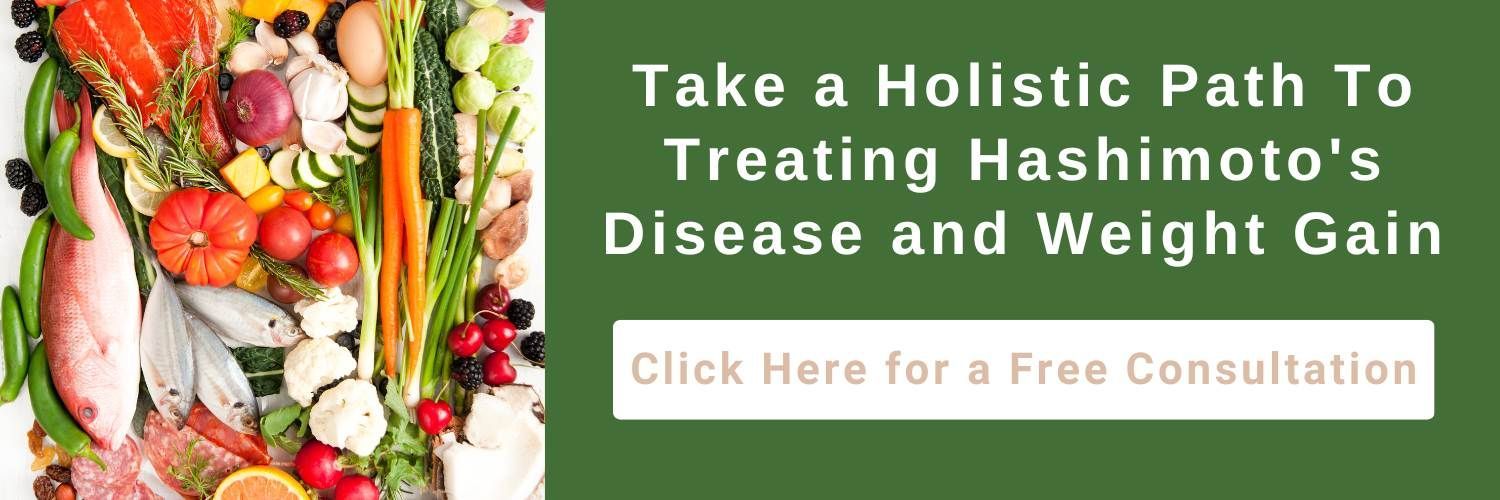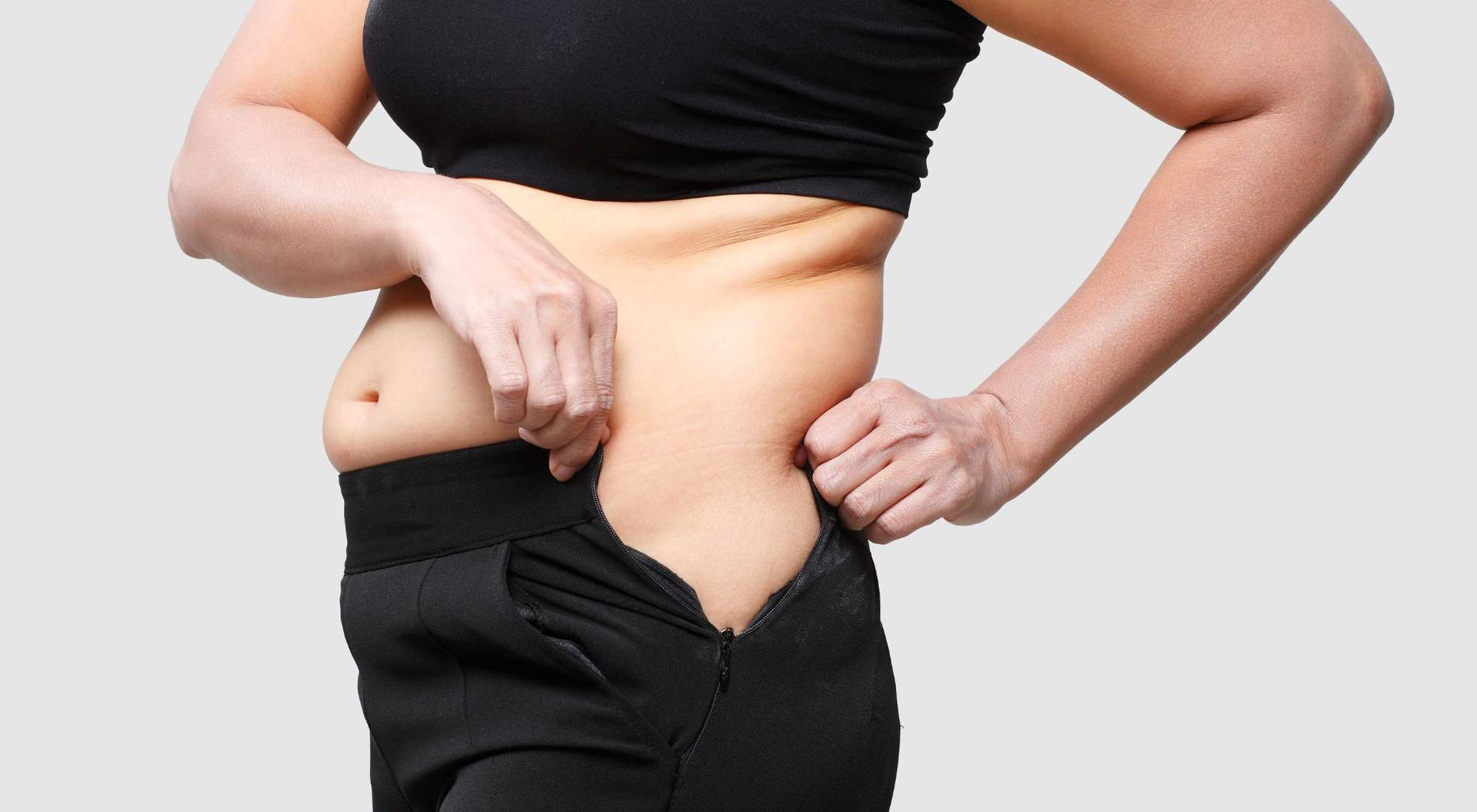Managing Weight Gain With Hashimoto’s: Causes and Solutions
"The content below is not intended to be a substitute for professional medical advice, diagnosis, or treatment. Always seek the advice of your physician or other qualified health provider with any questions you may have regarding a medical condition."
If you have been diagnosed with Hashimoto’s disease, you probably have to deal with a variety of symptoms. These may include:
- Fatigue
- Joint and muscle pain
- Constipation
- Decreased heart rate
- Dry skin
- Dry and thinning hair
- Irregular or heavy menstrual periods
- Fertility issues
- And more
But can Hashimoto’s disease cause weight gain?
Unfortunately, it can. In fact, this is one of the most common symptoms of the condition.
We’ll fill you in on the link between Hashimoto’s disease and weight gain, how much you can expect your weight to go up, and lifestyle changes you can make to combat this and possibly reverse your condition.
Table of Contents
- Does Hashimoto’s Cause Weight Gain?
- Why Does Hashimoto’s Disease Cause Weight Gain?
- Other Frequently Asked Questions About Hashimoto’s Disease and Weight Gain
- How Much Weight Do You Gain With Hashimoto’s?
- 10 Ways To Combat Hashimoto’s Disease Weight Gain
- Get the Holistic Help You Need for Hashimoto’s Disease With HealthierU in Brooklyn, NY
Does Hashimoto’s Cause Weight Gain?
Hashimoto’s disease is a common condition wherein chronic inflammation can damage the thyroid and hinder its ability to produce hormones, resulting in hypothyroidism. Hashimoto’s affects more women than men and is known to result in weight gain for most people who have it.
If you’re experiencing weight gain caused by Hashimoto’s disease, HealthierU would like to help. Why needlessly endure symptoms that make your life difficult when you can use holistic nutrition to improve and
even reverse your condition? Contact us to find out how we can help.
Why Does Hashimoto’s Disease Cause Weight Gain?
One of the big jobs of your thyroid is to help control your metabolism. It also regulates your appetite. When your thyroid is underactive and hormone levels are too low, the metabolism slows, and you burn less energy. Your body also becomes less likely to burn fat for fuel. All of this can lead to weight gain.
Another frequent issue that those with Hashimoto’s disease encounter is fatigue. This often leads to less physical activity, which in turn can also cause weight gain.
Other Frequently Asked Questions About Hashimoto’s Disease and Weight Gain
How Much Weight Do You Gain With Hashimoto’s?
Most people who experience weight fluctuation due to Hashimoto’s disease gain about 5-10 pounds. So while it’s annoying to have unnecessary weight gain due to your body’s systems not functioning properly, the issue isn’t insurmountable! We’ll provide more information about how to fight this side effect later.
What Is Hashimoto's Belly?
Hashimoto’s Belly refers to the abdominal bloating and increased belly fat that many people with Hashimoto’s thyroiditis experience. When an underactive thyroid slows the metabolism, it affects how the body processes fluids and stores fat. As a result, fluid retention and weight gain tend to accumulate around the midsection, creating a visibly swollen or “puffy” belly.
How Can Hashimoto's Disease Cause Bloating?
In addition to weight gain, this bloating can be worsened by digestive issues often linked to Hashimoto’s, such as slowed digestion or gut inflammation.
Slower Gut Motility
One example of slower gut motility is gastroparesis. With this condition, the stomach can’t process food the way it normally does — basically, it doesn’t empty correctly. This can cause:
- Bloating
- Nausea; and
- Bowel blockage
Other Hashimoto’s patients may experience constipation. The longer the stool stays in the gastrointestinal tract, the more time bacteria have to ferment. This can lead to excessive gas and bloating.
Small Intestinal Bacterial Overgrowth (SIBO)
Small intestinal bacterial overgrowth (SIBO) happens when too many bacteria from the large intestine migrate to the small intestine. They feed off the carbohydrates and simple sugars you consume, then emit excess gases that build up in the small intestine. This can lead to a large amount of abdominal pain.
How Do You Get Rid of Hashmito’s Weight Gain?
If you have gained weight because of your Hashimoto’s disease, getting rid of it can be hard work. But if you’re determined to make some diet and lifestyle changes, you can shed those excess pounds and also help manage your condition.
How much weight you gain can depend on the severity of your Hashimoto’s disease and hypothyroidism. If you don’t feel like you can meet the challenge on your own, you should find someone to help you.
Request a nutrition consultation with Dr. Donna Sergi at
HealthierU to get the guidance you need. As specialists in women’s health and wellness, we can identify and permanently alleviate your health-related symptoms — whether it be from Hashimoto’s disease or some other condition — using nutrition guidance and natural remedies.
10 Ways To Combat Hashimoto’s Disease Weight Gain
If you’re ready to lose the weight you’ve gained due to Hashimoto’s disease, here are some practical lifestyle changes you can implement that should help.
#1: Reduce Sugar in Your Diet
Not only can too much sugar cause you to gain weight, but it also leads to inflammation and all the issues that come along with it.
Simply carbohydrates, such as sugar, quickly break down into glucose, which your body uses as fuel. But when you eat more than you can burn, the excess glucose turns into fat.
If you have Hashimoto’s disease and are trying to lose weight, try to only have simple sugars as an occasional treat and stick more to complex carbohydrates, which your body metabolizes at a slower rate.
#2: Follow a Hashimoto’s Disease Diet Plan
A holistic nutrition plan, like the one we can help create for you at HealthierU, is a great regimen to follow when you’re dealing with Hashimoto’s disease. This type of diet may help you:
- Avoid processed foods
- Reduce junk food; and
- Cut back on sugar
But you also want to try to stay away from any type of food that will lead to inflammation. Here are our recommendations for what to avoid and what to eat on a Hashimoto’s disease diet plan.
Remember that you should always discuss your diet with your doctor or another healthcare professional.
What To Avoid
Some foods that cause inflammation for Hashimoto’s patients contain soy, gluten, or dairy, so it’s best to stay away from those if possible.
Other foods that you may want to eliminate from your diet include:
- Alcohol
- Alternative sweeteners such as sucralose and aspartame
- Chocolate
- Coffee
- Dried fruits
- Nightshades (tomatoes, potatoes, peppers)
- Nuts and seeds
- Simple sugars
You may want to experiment to see how cutting out certain foods works best for you or eliminate one food group at a time to determine how your body responds.
What To Eat
Increasing numbers of health professionals are recommending the AIP (Autoimmune Protocol) diet for Hashimoto’s disease-related weight loss. This eating plan is similar to paleo but somewhat stricter.
The AIP diet recommends eating foods shown to have anti-inflammatory properties. These may include:
- Cruciferous vegetables like broccoli, kale, and cabbage
- Lean proteins like beef, eggs, pork, poultry, and seafood
- Non-dairy fermented foods (kimchi, kombucha, sauerkraut)
- Some fruits, honey, and maple syrup
- Sulfur-rich vegetables such as garlic, leeks, and onions
- Green tea
#3: Exercise Regularly
Not only can regular exercise help you burn excess calories and lose weight, but it can also:
- Boost your energy levels
- Help fight depression
- Help reduce joint pain; and
- Increase your self-esteem
And you don’t have to endure an intense workout session every day to reap its benefits. Light activities — even just three times a week — can help with weight gain and other symptoms.
Over time, you may want to increase the frequency and intensity of your workouts as you can. Be sure to talk to your doctor before starting an exercise program.
#4: Get Enough Sleep
You know sleep is important, but you may not have known that it can affect your weight. Studies have shown that people who are sleep-deprived eat more calories, which leads to weight gain.
Lack of sleep can also raise your stress levels, and an increase in the stress hormone cortisol can supercharge your appetite.
To help yourself get more and better sleep, try these tips:
- Avoid screen time right before bed.
- Establish a soothing bedtime routine.
- Keep your room and bedding cool and wear light clothing.
- Consider taking supplements such as melatonin.
#5: Cut Back or Eliminate Alcohol
Alcohol can not only add a lot of calories to your diet, but it can also negatively affect your sleep and slow down your systems, which are already sluggish due to Hashimoto’s disease.
Cutting back on how much you drink may improve your energy and sleep and eventually lead to weight loss.
#6: Look Into Environmental Factors
If you’re doing everything you can to address your Hashimoto’s disease and aren’t having success, you may need to consider that environmental factors could be at play.
For example, if you’re exposed to unhealthy levels of mold, it can impact your hormones and stress your adrenal glands. This can lead to higher cortisol levels and impact the thyroid hormones, all of which can cause you to gain weight.
Other environmental factors that may trigger Hashimoto’s disease include:
- Bisphenol-A (BPA)
- Insufficient sun exposure
- Irradiation
- Polychlorinated biphenyls (PCBs)
- Some synthetic pesticides
#7: Try Natural Remedies
Since bloating leads to Hashimoto’s belly and can cause extra discomfort caused by weight gain, some people have tried natural remedies to help combat these symptoms.
Many have found success with alternative remedies such as:
- Activated charcoal supplements
- Apple cider vinegar
- Chamomile
- Cloves
- Ginger
- Peppermint
#8: Manage Stress Effectively
Chronic stress raises
cortisol levels, which can worsen thyroid function and lead to increased abdominal fat. Incorporating stress-reducing practices like mindfulness meditation, yoga, deep breathing exercises, or even regular time in nature can help balance hormones and support weight loss efforts.
#9: Support Gut Health
A healthy gut microbiome plays a
crucial role in immune function and metabolism. Hashimoto’s can be linked with gut inflammation or
dysbiosis. Eating probiotic-rich foods, taking probiotics if appropriate, and avoiding gut irritants can improve digestion and may help reduce bloating and weight issues.
#10: Optimize Your Thyroid Medication and Work with Your Doctor
Sometimes, weight gain persists despite lifestyle changes because thyroid hormone levels aren’t optimized. Regular lab testing and close communication with your healthcare provider can ensure your medication dosage is correct, helping improve metabolism and support weight management
Get the Holistic Help You Need for Hashimoto’s Disease With HealthierU in Brooklyn, NY
If you’re dealing with Hashimoto’s disease and subsequent weight gain, contact HealthierU for a free consultation. We believe that, with a holistic program of proper nutrition and natural remedies, you can help reverse your condition and the symptoms that come along with it.
The journey toward a healthier you starts here. Contact us today to get started.






